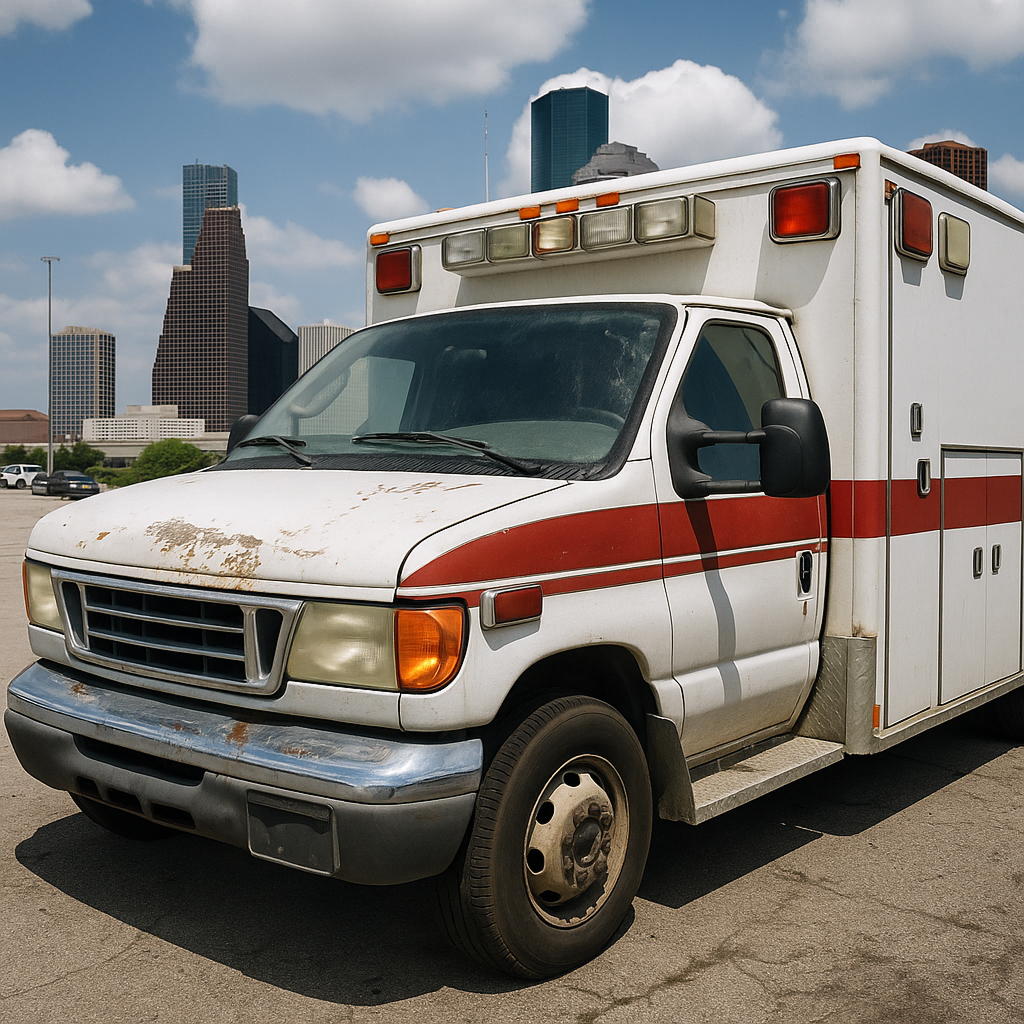Ambulances and emergency rigs are more than vehicles. They are lifelines for patients and tools for first responders. At TX RV Repair in Houston, our team understands the critical role these vehicles play. We bring years of hands-on experience servicing RVs, motorhomes, and emergency rigs to ensure they remain safe, reliable, and ready for action.
This article explains why specialized service matters for ambulances and emergency rigs. It also shows how certified technicians and preventive maintenance protect patients, crews, and budgets.
Emergency Rigs Are Different from Standard Vehicles
Ambulances and emergency rigs face extreme use. They run heavy equipment, carry lifesaving devices, and must accelerate and stop under load. They idle for long periods while running climate control and electronics. This puts unique stress on every system.
A standard automotive shop may do basic repairs. But these vehicles need more. Specialized service addresses weight distribution, braking systems, electrical loads, and onboard medical equipment. Without expert maintenance, one overlooked detail can cause a failure during an emergency call.
Reliability and Readiness: Zero Tolerance for Downtime
Why Reliability Matters
Lives depend on ambulances being ready every time they roll out. A mechanical failure can delay care or force another crew to cover calls. For a fleet manager, every breakdown means overtime costs, service disruptions, and public safety risks.
Preventive Maintenance Reduces Breakdowns
Expert technicians follow strict inspection schedules. They check brakes, driveline components, electrical systems, and emergency equipment. They identify small issues before they become expensive failures. Regular servicing also keeps response times fast because vehicles run at peak performance.
At TX RV Repair, we approach every emergency rig with this mindset. Our team combines RV expertise with emergency vehicle standards to help agencies keep rigs in service, not sitting in a bay.
Safety for Patients and Crew
Vehicle Condition Directly Affects Safety
A well-maintained ambulance protects everyone on board. Faulty brakes, worn tires, or leaking hydraulic systems increase the risk of accidents. Heavy braking, sudden stops, and frequent turns push these systems harder than normal vehicles can handle.
Securing Equipment Prevents Injury
Inside an ambulance, unsecured gear can become dangerous during a crash or abrupt stop. Expert technicians check and secure mounts for medical equipment, cabinets, and stretchers. This protects patients and first responders during transport.
Examples from the Field
Our team has seen firsthand how small oversights can create big hazards. We have inspected rigs where oxygen tanks were loosely strapped or cabinets were not latched correctly. Correcting these issues can mean the difference between a safe transport and a preventable injury.
Compliance with Regulations and Standards
Emergency vehicles must meet strict federal and state safety standards. These include requirements for medical equipment, lighting, sirens, and mechanical systems. Documentation of maintenance is essential in case of audits, inspections, or legal reviews.
Why Certified Service Matters
Certified technicians understand these regulations. They perform maintenance that aligns with industry and government standards. This protects agencies from fines and liability while ensuring vehicles pass inspections on time.
At TX RV Repair, we maintain detailed service records for every vehicle. This gives fleet managers proof of compliance and peace of mind.
Specialized Equipment and Systems Require Specialized Knowledge
Medical Equipment Maintenance
Ambulances carry defibrillators, infusion pumps, oxygen delivery systems, and other critical devices. Technicians trained in emergency rigs know how to inspect, test, and maintain this equipment. They also understand the power needs of these devices during long transports.
Electrical Systems
Emergency rigs run high-powered lights, sirens, radios, and computer systems. The electrical demand is much higher than in a standard motorhome or truck. Expert service includes testing batteries, alternators, wiring, and load-handling systems to prevent failures during a call.
Cleanliness and Sanitation
Professional service also involves cleaning and disinfecting interiors. A sanitized rig prevents infection and protects patients and staff. This step is as vital as mechanical maintenance.
Financial and Operational Efficiency
Preventive Maintenance Saves Money
It costs less to prevent problems than to fix a breakdown. Catching a brake issue early may cost a few hundred dollars. Ignoring it can lead to a catastrophic failure costing thousands and putting a vehicle out of service.
Extended Vehicle Lifespan
These rigs are high-value assets. Expert care extends their operational life, delaying the need for costly replacements. This helps fleet managers plan budgets and avoid surprise expenses.
Minimized Downtime
Scheduled maintenance means you control when a rig is unavailable. Unplanned breakdowns disrupt schedules and reduce the number of vehicles ready for emergencies. This directly impacts response times and public safety.
How to Ensure Expert Service for Your Fleet
Look for Certified Technicians
Technicians with Emergency Vehicle Technician (EVT) certification have specialized training in ambulances, fire trucks, and police vehicles. Automotive Service Excellence (ASE) certifications further show expertise in critical systems.
Ask About Continuing Education
Emergency vehicle technology changes quickly. Qualified technicians stay updated with training and education. This ensures your fleet benefits from the latest best practices.
Choose a Service Provider That Understands Emergency Rigs
At TX RV Repair, our background in motorhomes gives us unique insight into large, complex vehicles. We combine that with emergency vehicle service standards to offer a complete solution for agencies in Houston and beyond.
The Importance of Daily Rig Checks by Crews
Crew Responsibility Complements Professional Service
Even the best maintenance schedule cannot replace daily checks. Crews who inspect their rigs at the start of every shift catch problems early. This includes checking fluid levels, confirming medical supplies, and testing lights and sirens.
Five Key Benefits of Rig Checks
- Compliance: Most states require regular checks and documentation.
- Supply Readiness: Missing or broken equipment can delay care on scene.
- Crew Familiarity: Handling equipment during checks builds muscle memory for emergencies.
- Working Condition: Regular checks reveal expired or damaged supplies.
- Accountability: Consistent checks ensure nothing is overlooked from one shift to the next.
Fleet managers can combine expert maintenance with crew-level inspections to keep vehicles safe and ready.
A Real-World Example
One Houston-area EMS provider brought an ambulance to TX RV Repair with recurring brake fade. Our technicians found worn air brake components that a general shop had missed. After replacing the parts and adjusting the system, braking performance returned to safe levels. The agency reported fewer maintenance calls and improved driver confidence in the weeks that followed.
This case shows how certified service can prevent risks, reduce downtime, and extend vehicle life.
Expertise Protects Lives and Budgets
Servicing ambulances and emergency rigs is not the same as working on a standard truck or van. These vehicles carry lives, equipment, and the reputation of the agencies that run them. Expert maintenance ensures reliability, safety, compliance, and cost control.
At TX RV Repair, we bring our experience with motorhomes and emergency rigs to every job. Our certified technicians keep your fleet ready to respond when seconds count.
Call TX RV Repair today to learn how we can help your ambulances and emergency rigs stay safe, reliable, and ready for the road.

